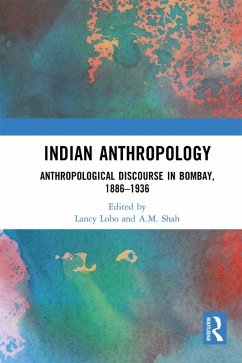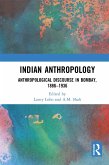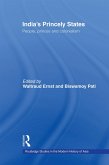Indian Anthropology (eBook, PDF)
Anthropological Discourse in Bombay, 1886-1936
Redaktion: Lobo, Lancy; Shah, A. M.
44,95 €
44,95 €
inkl. MwSt.
Sofort per Download lieferbar

22 °P sammeln
44,95 €
Als Download kaufen

44,95 €
inkl. MwSt.
Sofort per Download lieferbar

22 °P sammeln
Jetzt verschenken
Alle Infos zum eBook verschenken
44,95 €
inkl. MwSt.
Sofort per Download lieferbar
Alle Infos zum eBook verschenken

22 °P sammeln
Indian Anthropology (eBook, PDF)
Anthropological Discourse in Bombay, 1886-1936
Redaktion: Lobo, Lancy; Shah, A. M.
- Format: PDF
- Merkliste
- Auf die Merkliste
- Bewerten Bewerten
- Teilen
- Produkt teilen
- Produkterinnerung
- Produkterinnerung

Bitte loggen Sie sich zunächst in Ihr Kundenkonto ein oder registrieren Sie sich bei
bücher.de, um das eBook-Abo tolino select nutzen zu können.
Hier können Sie sich einloggen
Hier können Sie sich einloggen
Sie sind bereits eingeloggt. Klicken Sie auf 2. tolino select Abo, um fortzufahren.

Bitte loggen Sie sich zunächst in Ihr Kundenkonto ein oder registrieren Sie sich bei bücher.de, um das eBook-Abo tolino select nutzen zu können.
Indian Anthropology is an important contribution to the history of Indian anthropology, focusing on its formative period. It looks at the political economy of knowledge production and the anthropological discourse in Bombay during the late nineteenth century.
- Geräte: PC
- mit Kopierschutz
- eBook Hilfe
Andere Kunden interessierten sich auch für
![Routledge Revivals: The True India (1939) (eBook, PDF) Routledge Revivals: The True India (1939) (eBook, PDF)]() C. F. AndrewsRoutledge Revivals: The True India (1939) (eBook, PDF)34,95 €
C. F. AndrewsRoutledge Revivals: The True India (1939) (eBook, PDF)34,95 €![Routledge Revivals: The Challenge of the North-West Frontier (1937) (eBook, PDF) Routledge Revivals: The Challenge of the North-West Frontier (1937) (eBook, PDF)]() C. F. AndrewsRoutledge Revivals: The Challenge of the North-West Frontier (1937) (eBook, PDF)34,95 €
C. F. AndrewsRoutledge Revivals: The Challenge of the North-West Frontier (1937) (eBook, PDF)34,95 €![Routledge Revivals: Mahatma Gandhi's Ideas (1929) (eBook, PDF) Routledge Revivals: Mahatma Gandhi's Ideas (1929) (eBook, PDF)]() C. F. AndrewsRoutledge Revivals: Mahatma Gandhi's Ideas (1929) (eBook, PDF)40,95 €
C. F. AndrewsRoutledge Revivals: Mahatma Gandhi's Ideas (1929) (eBook, PDF)40,95 €![Indian Anthropology (eBook, ePUB) Indian Anthropology (eBook, ePUB)]() Indian Anthropology (eBook, ePUB)44,95 €
Indian Anthropology (eBook, ePUB)44,95 €![The Sacred Waters 'of' Varanasi (eBook, PDF) The Sacred Waters 'of' Varanasi (eBook, PDF)]() Mahesh GogateThe Sacred Waters 'of' Varanasi (eBook, PDF)42,95 €
Mahesh GogateThe Sacred Waters 'of' Varanasi (eBook, PDF)42,95 €![Urbanisation in Bengal (eBook, PDF) Urbanisation in Bengal (eBook, PDF)]() Urbanisation in Bengal (eBook, PDF)42,95 €
Urbanisation in Bengal (eBook, PDF)42,95 €![India's Princely States (eBook, PDF) India's Princely States (eBook, PDF)]() India's Princely States (eBook, PDF)47,95 €
India's Princely States (eBook, PDF)47,95 €-
-
-
Indian Anthropology is an important contribution to the history of Indian anthropology, focusing on its formative period. It looks at the political economy of knowledge production and the anthropological discourse in Bombay during the late nineteenth century.
Dieser Download kann aus rechtlichen Gründen nur mit Rechnungsadresse in A, B, BG, CY, CZ, D, DK, EW, E, FIN, F, GR, HR, H, IRL, I, LT, L, LR, M, NL, PL, P, R, S, SLO, SK ausgeliefert werden.
Produktdetails
- Produktdetails
- Verlag: Taylor & Francis eBooks
- Seitenzahl: 172
- Erscheinungstermin: 30. September 2021
- Englisch
- ISBN-13: 9781000462432
- Artikelnr.: 62497188
- Verlag: Taylor & Francis eBooks
- Seitenzahl: 172
- Erscheinungstermin: 30. September 2021
- Englisch
- ISBN-13: 9781000462432
- Artikelnr.: 62497188
- Herstellerkennzeichnung Die Herstellerinformationen sind derzeit nicht verfügbar.
Lancy Lobo is currently the Director, Centre for Culture and Development, Vadodara, India. He has earlier served as the Director, Centre for Social Studies, Surat. He has conducted extensive studies on dalits, tribals, OBCs and minorities in rural and urban Gujarat. He has authored, co-authored and edited twenty-two books. A.M. Shah is former Professor of Sociology at the Delhi School of Economics, University of Delhi, India. He has been felicitated with the Lifetime Achievement Award by the Indian Sociological Society, the Swami Pranavananda Award by the University Grants Commission, a National Fellowship by the Indian Council of Social Science Research, and the Distinguished Service Award by the University of Delhi. He has been a Visiting Fellow at several universities and institutes in India and abroad and has authored and edited many books on a variety of subjects. His books and papers on household and family in India are collected in an omnibus (Delhi, 2006).
Introduction. Inauguration of the Anthropological Society of Bombay, 1886:
A Vision for Anthropology in India Part I: History of the Development of
Anthropology in India 1. Anthropology in India 2. Progress of the Study of
Indian Anthropology in Europe, and Cognate Matters 3. Development or
Evolution of Anthropology in India 4. Study of Anthropology in India 5.
The Study of Anthropology in the West 6. The Retrospect and the Prospect of
the Work of the Anthropological Society of Bombay Part II: Methodology and
Collecting Ethnographic Data 7. Importance of Collecting Facts
(Presidential Address) 8. Collecting Diverse Social and Cultural Facts
(Presidential Address, 1906) 9. The Study of Ethnography in the Bombay
Presidency 10. The Ethnographical Survey of India Part III: Theoretical
Analysis of Ethnographic Facts 11. Totem Theories 12. Is the Retention of
the Term Animism in Census Justified? 13. The Superstition of Concealing
One's Proper Age as Shown by the Indian Census Statistics 14. Interpreting
a Government House Reception from a Cultural Anthropology Perspective
A Vision for Anthropology in India Part I: History of the Development of
Anthropology in India 1. Anthropology in India 2. Progress of the Study of
Indian Anthropology in Europe, and Cognate Matters 3. Development or
Evolution of Anthropology in India 4. Study of Anthropology in India 5.
The Study of Anthropology in the West 6. The Retrospect and the Prospect of
the Work of the Anthropological Society of Bombay Part II: Methodology and
Collecting Ethnographic Data 7. Importance of Collecting Facts
(Presidential Address) 8. Collecting Diverse Social and Cultural Facts
(Presidential Address, 1906) 9. The Study of Ethnography in the Bombay
Presidency 10. The Ethnographical Survey of India Part III: Theoretical
Analysis of Ethnographic Facts 11. Totem Theories 12. Is the Retention of
the Term Animism in Census Justified? 13. The Superstition of Concealing
One's Proper Age as Shown by the Indian Census Statistics 14. Interpreting
a Government House Reception from a Cultural Anthropology Perspective
Introduction. Inauguration of the Anthropological Society of Bombay, 1886:
A Vision for Anthropology in India Part I: History of the Development of
Anthropology in India 1. Anthropology in India 2. Progress of the Study of
Indian Anthropology in Europe, and Cognate Matters 3. Development or
Evolution of Anthropology in India 4. Study of Anthropology in India 5.
The Study of Anthropology in the West 6. The Retrospect and the Prospect of
the Work of the Anthropological Society of Bombay Part II: Methodology and
Collecting Ethnographic Data 7. Importance of Collecting Facts
(Presidential Address) 8. Collecting Diverse Social and Cultural Facts
(Presidential Address, 1906) 9. The Study of Ethnography in the Bombay
Presidency 10. The Ethnographical Survey of India Part III: Theoretical
Analysis of Ethnographic Facts 11. Totem Theories 12. Is the Retention of
the Term Animism in Census Justified? 13. The Superstition of Concealing
One's Proper Age as Shown by the Indian Census Statistics 14. Interpreting
a Government House Reception from a Cultural Anthropology Perspective
A Vision for Anthropology in India Part I: History of the Development of
Anthropology in India 1. Anthropology in India 2. Progress of the Study of
Indian Anthropology in Europe, and Cognate Matters 3. Development or
Evolution of Anthropology in India 4. Study of Anthropology in India 5.
The Study of Anthropology in the West 6. The Retrospect and the Prospect of
the Work of the Anthropological Society of Bombay Part II: Methodology and
Collecting Ethnographic Data 7. Importance of Collecting Facts
(Presidential Address) 8. Collecting Diverse Social and Cultural Facts
(Presidential Address, 1906) 9. The Study of Ethnography in the Bombay
Presidency 10. The Ethnographical Survey of India Part III: Theoretical
Analysis of Ethnographic Facts 11. Totem Theories 12. Is the Retention of
the Term Animism in Census Justified? 13. The Superstition of Concealing
One's Proper Age as Shown by the Indian Census Statistics 14. Interpreting
a Government House Reception from a Cultural Anthropology Perspective







